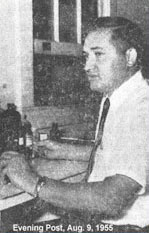Marine Lab Director Assumes New Duties

Evening Post, August 9, 1955
Dr. Joseph R. Merkel, director of the College of Charleston’s marine biological laboratory at Fort Johnson, is a man who likes to fish. Privately—when not at work—he’s best with a rod and reel. As a marine biologist, he’s effective with a bucket.
Professionally, the tools of his trade—and those of the College’s marine laboratory—consist mostly of probes, chemicals and microscopes. With these he can find out what goes on in ocean life of micro-organisms such as bacteria, yeast and fungi.
And that is important for a number of reasons. Problems related in the activities of these minute animal and plant forms include water pollution, ocean food cycles and a myriad of biochemical mysteries.
The marine biologist, as an investigator into the going-on among these micro-organisms, is becoming more important each day. For one thing, he may hold in that sampling bucket of ocean water certain organisms which may implement the development of modern medicine’s “wonder drugs.”
Dr. Merkel’s first task at the Fort Johnson laboratory, however, is the conversion of the former quarantine station’s hospital building to a laboratory. Then he will need a boat.
The marine laboratory this fall will offer College of Charleston students a general course in marine biology. This will include study of the larger forms of sea life as well as the more numerous micro-organisms.
Then, too, as the marine laboratory is expanded, Dr. Merkel, and the college, hope to receive visiting researchers and offer them facilities for study.
According to Dr. Merkel, plans are being made for these laboratory facilities to be made available to industrial researchers as well as research personnel from other colleges and universities.
Dr. Merkel, his wife and five year old-son, Glenn, have been living at Fort Johnson for the last week. He came to the College of Charleston from the Institute of Microbiology at New Brunswick, N. J.
He received his Ph.D. degree from Maryland University and was awarded a Waskman-Merck post doctoral fellowship in 1952 for study at Rutgers University.






